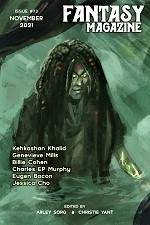“Lessons” by Billie Cohen
“The Petticoat Government” by Kehkashan Khalid
“Shouty Lads” by Charles EP Murphy
“Girls Have Sharp Teeth” by Genevieve Mills
Reviewed by Victoria Silverwolf
Two short stories and two works of flash fiction appear in this issue.
“Lessons” by Billie Cohen is a brief tale in which a teacher is trapped in a bubble, unable to leave the school. A student helps to find the way out. That’s about all there is to this little story. It manages to convey the message that students and teachers should benefit each other, but otherwise it’s a very minor piece.
“The Petticoat Government” by Kehkashan Khalid takes place in Sixteenth Century India. The narrator, a concubine, becomes the guardian of the young heir to the throne. The prince grows up to be a languid, decadent ruler, so the narrator gives him a potion to make him ambitious. A conflict between the narrator’s son and the monarch leads to tragedy. Eventually, the potion causes a supernatural transformation.
I have greatly simplified the plot of a complex story with an intricate, fully realized background. The author is obviously very familiar with the Mughal Empire, and conveys the setting vividly. The fantasy element may be the least interesting aspect of a fascinating work of historical fiction. Readers without extensive knowledge of the time and place may find many names and terms confusing, and are likely to have to stop reading at times to do research on them.
“Shouty Lads” by Charles EP Murphy is an extremely short account of a fellow who investigates noises in the middle of the night, which turn out to be a group of men fighting a monster. The creature is a figure from British folklore. The story ends with a reference that went right over my head. Given the setting, Londoners may understand this story better than I did.
In “Girls Have Sharp Teeth” by Genevieve Mills, a teenage girl has four teeth knocked out during a fight with her boyfriend. She replaces them with fangs. This becomes a fad among the other girls at her school, who cap their teeth with fangs or just wear plastic ones. Many of them, perhaps all, have suffered from some form of abuse, and the sharp teeth make them feel more secure.
The narrator of this offbeat story acknowledges that the reader probably expects the girls to take some kind of revenge on their oppressors with their new weapons, but this does not happen. The premise barely qualifies as fantasy; the only speculative aspect seems to be the willingness of a dentist to give the girl fangs. One small narrative technique is puzzling. The characters are identified by first name and initial (such as Madison S.), almost like a clinical study. The point of this escapes me.
Victoria Silverwolf will work extra hours tomorrow.
 Fantasy
Fantasy